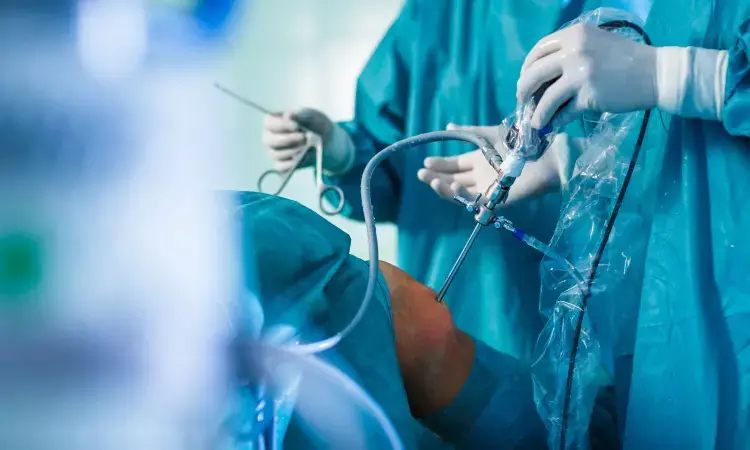- Home
- Medical news & Guidelines
- Anesthesiology
- Cardiology and CTVS
- Critical Care
- Dentistry
- Dermatology
- Diabetes and Endocrinology
- ENT
- Gastroenterology
- Medicine
- Nephrology
- Neurology
- Obstretics-Gynaecology
- Oncology
- Ophthalmology
- Orthopaedics
- Pediatrics-Neonatology
- Psychiatry
- Pulmonology
- Radiology
- Surgery
- Urology
- Laboratory Medicine
- Diet
- Nursing
- Paramedical
- Physiotherapy
- Health news
- Fact Check
- Bone Health Fact Check
- Brain Health Fact Check
- Cancer Related Fact Check
- Child Care Fact Check
- Dental and oral health fact check
- Diabetes and metabolic health fact check
- Diet and Nutrition Fact Check
- Eye and ENT Care Fact Check
- Fitness fact check
- Gut health fact check
- Heart health fact check
- Kidney health fact check
- Medical education fact check
- Men's health fact check
- Respiratory fact check
- Skin and hair care fact check
- Vaccine and Immunization fact check
- Women's health fact check
- AYUSH
- State News
- Andaman and Nicobar Islands
- Andhra Pradesh
- Arunachal Pradesh
- Assam
- Bihar
- Chandigarh
- Chattisgarh
- Dadra and Nagar Haveli
- Daman and Diu
- Delhi
- Goa
- Gujarat
- Haryana
- Himachal Pradesh
- Jammu & Kashmir
- Jharkhand
- Karnataka
- Kerala
- Ladakh
- Lakshadweep
- Madhya Pradesh
- Maharashtra
- Manipur
- Meghalaya
- Mizoram
- Nagaland
- Odisha
- Puducherry
- Punjab
- Rajasthan
- Sikkim
- Tamil Nadu
- Telangana
- Tripura
- Uttar Pradesh
- Uttrakhand
- West Bengal
- Medical Education
- Industry
Bariatric surgery tied to lessened use of lipid-lowering, cardiovascular, and antidiabetic medications

The study entitled "Temporal Changes in Obesity-Related Medication After Bariatric Surgery vs No Surgery for Obesity" by lead researcher Joonas H. Kauppila and the team has demonstrated a long-lasting reduction in the use of lipid-lowering and antidiabetic medication among those with bariatric surgery compared to patients with an obesity diagnosis treated without surgery.
This Original Investigation is published in JAMA Surgery.
It is already known that Bariatric surgery resolves conditions like hyperlipidemia, cardiovascular disease, and diabetes. More research and data should be needed regarding long-term postoperative trajectories of medications for these conditions. The data remains scarce in this context.
Researchers in the present study researched this background in a population-based cohort study.
(Sweden and Finland) and included individuals diagnosed with obesity.
The key results of the study are:
- Twenty-six thousand three hundred ninety-six patients underwent bariatric surgery, either gastric bypass or sleeve gastrectomy.
- There was a decrease in the proportion of lipid-lowering medication following bariatric surgery from 20.3 % ( baseline) to 12.9% (after two years) and 17.6% (after 15 years).
- The proportion of lipid-lowering medication increased in the no-surgery group from 21.0% (at baseline) to 44.6% (15 years).
- There was a decrease in Cardiovascular medications used by bariatric surgery patients from 60.2% at baseline to 43.2% after two years. It increased to 74.6% after 15 years. In the surgery group, it increased from 54.4% at baseline to 83.3% after 15 years.
- In the bariatric surgery group, there was a decrease in the use of Antidiabetic medications, from 27.7% at baseline to 10.0% after two years. It increased to 23.5% after 15 years. In the surgery group, antidiabetic medicine use increased from 27.7% (baseline) to 54.2% after 15 years.
Concluding further, they said bariatric surgeries reduce the use of lipid-lowering and antidiabetic medications (long-lasting reduction) compared with no surgery for obesity. This reduction was only transient in the case of cardiovascular medicines.
The key strengths of the study were long and complete follow-up, population-based design, matching of comparable control patients with morbid obesity, and the large sample size retrieved from 2 countries.
Further reading:
Kauppila JH, Markar S, Santoni G, Holmberg D, Lagergren J. Temporal Changes in Obesity-Related Medication After Bariatric Surgery vs No Surgery for Obesity. JAMA Surg. Published online May 24, 2023. doi:10.1001/jamasurg.2023.0252
BDS, MDS in Periodontics and Implantology
Dr. Aditi Yadav is a BDS, MDS in Periodontics and Implantology. She has a clinical experience of 5 years as a laser dental surgeon. She also has a Diploma in clinical research and pharmacovigilance and is a Certified data scientist. She is currently working as a content developer in e-health services. Dr. Yadav has a keen interest in Medical Journalism and is actively involved in Medical Research writing.
Dr Kamal Kant Kohli-MBBS, DTCD- a chest specialist with more than 30 years of practice and a flair for writing clinical articles, Dr Kamal Kant Kohli joined Medical Dialogues as a Chief Editor of Medical News. Besides writing articles, as an editor, he proofreads and verifies all the medical content published on Medical Dialogues including those coming from journals, studies,medical conferences,guidelines etc. Email: drkohli@medicaldialogues.in. Contact no. 011-43720751


